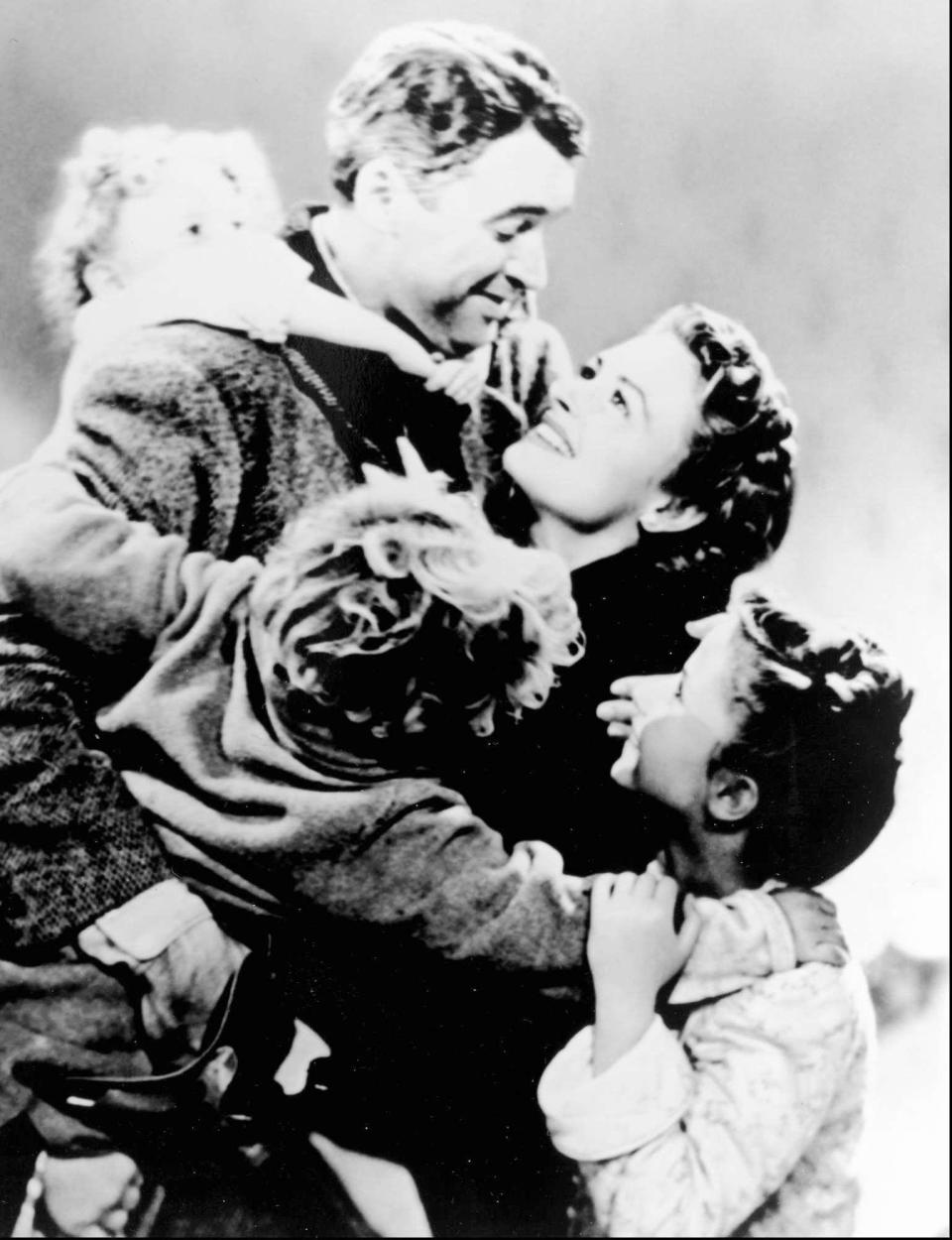Despite fights and failures, it really can be a wonderful story| MARK HUGHES COBB
- Oops!Something went wrong.Please try again later.
- Oops!Something went wrong.Please try again later.
The tinsel's melting, floo-floovers flumping, halls un-be-decking, so we're merrily done for another year on the three features movie-related hacks (Hello!) recycle each holiday season:
"Die Hard" Is/Isn't a Holiday Classic. Best meme: "It was declared a Christmas movie at the Council of Nicea! I can't believe I still have to get angry about this!" Yippie-ki-yay, and to all a Ho Ho Ho, now I've got a machine gun.
Why "Love Actually" Is A Fantastic/Horrible Christmas movie. Trick: It's both. The creepy so-called best-friend with cue cards macking on a charmless Keira would make a truly horrific coffee commercial, and the women are far more often objects and victims than active participants. But there are belly laughs in the dancing prime minister, Bill Nighy's louche pop stardom, and of course the stand-ins, with seasonally-appropriate melancholia slabbed on via Joni Mitchell, the devoted sister, and a premonition of Liam Neeson's future.
And How the Heck Did "It's a Wonderful Life" Become a Holiday Classic?
You know the basics: Flopped in 1946, when the post-war U.S. was in a more celebratory mood than not; became a hit decades later thanks to TV repeats, when copyrights expired.
More:Standing up in support of the folks with the mojo | MARK HUGHES COBB
Directed by Frank Capra, too easily dismissed with the epithet "Capra-corn," forgetting his stories traveled vanta black before returning (mostly) from journeys through haunted forests, and starring Jimmy Stewart, making his Hollywood comeback after fighting Nazis for three years, unlike chicken hawks such as Marion Morrison (aka John Wayne), who stayed home and talked the talk.
Stewart was already a star in his mid-30s, having just won the Academy Award for Best Actor in "The Philadelphia Story." But feeling the call, he enlisted as a buck private — originally rejected for being underweight — working his way up to colonel in the Army Air Corps, flying 20 combat missions over Germany, leading a squadron of B-24 bombers. He'd learned to fly as a young man, inspired by Charles Lindbergh's solo crossing of the Atlantic, but felt drawn toward drama while attending Princeton.
For his service, Stewart won two Distinguished Flying Crosses, four Air Medals, and the Croix de Guerre with bronze palm, among others. He could have stacked those next to a pair of Oscars, a Grammy, some Golden Globes ... he'd probably need a second house for bestowed honorary titles alone.
But just having returned to the myth-making world, Stewart was frightened, suffering probably from post-traumatic stress disorder, multiplied by knowing he'd left the industry behind, letting his contract with MGM expire, fearing he was over the hill at 37.

He'd worked with Capra before, on the 1939 "Mr. Smith Goes to Washington" and the 1938 film of "You Can't Take It With You," so Stewart took his call about a ... Christmas card? Writer Philip Van Doren Stern cooked up the American-fried spin on Charles Dickens' 1843 novella "A Christmas Carol" starting in 1938, working on a story he called "The Greatest Gift" until 1943. Publishers weren't biting, so he printed the 4,000-word tale as an extended greeting, mailed out to 200 friends. Within the next year it got printed as a book, then reprinted in magazines including Good Housekeeping, which published under the title "The Man Who Was Never Born."
An iteration reached RKO producer David Hempstead, who bought the rights for $10,000. Cary Grant was interested, so writers typed away until RKO sold the rights in 1945, to Capra's Liberty Films. Spoiler: RKO shoulda held out. It was Capra who created the "IAWL" we know: Stern's "Gift" was a rough outline.
Years later, Stewart recalled how the producer-director-writer sold him:
“You play a fella in a small town. You get married, you have all these kids, and your father dies, and you have to take over the building and loan. And finally, you’re going to kill yourself, you’re going to jump off a bridge, and an angel, by the name of Clarence, comes in to help you, but he can’t swim, so you go down and save the ..... ”
He trailed off, Stewart recalled. “This doesn’t sound very good, does it?” But Stewart, yearning to get back in business, and trusting Capra, just said: “When do we start?”
Capra brought on husband-and-wife team Frances Goodrich and Albert Hackett to work on the script, which had already been hashed over by typists including Dalton Trumbo (Oscar-winner known for "Roman Holiday," "Papillon," "Spartacus"), Clifford Odets ("Sweet Smell of Success," "None but the Lonely Hearts") and Marc Connelly (a Pulitzer-Prize-winning playwright, co-opted by Hollywood to write "The Spirit of St. Louis," "The Green Pastures" and others). But they'd stalled on the idea of George Bailey as a small-town politician growing ever more cynical, and the angel showing him how Bedford Falls would have turned out had he been in business, rather than public service. While discouraging businessmen from thinking they're qualified for public service seems a solid idea, the reverse may not be as true.
Frictions arose between Goodrich-Hackett and Capra, because the latter had also brought in hired guns Jo Swerling ("Lifeboat," "The Pride of the Yankees," the "Guys and Dolls" adaptation), Michael Wilson ("Lawrence of Arabia," "The Bridge on the River Kwai," "A Place in the Sun") and ... wait ... Dorothy Parker?
Somehow I've missed that, all these years. That Pulitzer-Algonquin jumble of scribblers helps explain the wonky charms of "IAWL," just as the reported 17 or 18 who co-wrote the "Casablanca" screenplay gelled.
My guesses for Parker's contributions:
"Out you two pixies go, tru da door, or out da window."
"Ah, youth is wasted on the wrong people."
"Eighteen! Why it was only last year you were seventeen!"
"George, I am an old man and most people hate me, but I don't like them either, so that makes it all even."
"Hey look, mister. We serve hard drinks in here for men who want to get drunk fast, and we don't need any characters around to give the joint atmosphere. Is that clear, or do I have to slip you my left for a convincer?"
And probably the bit with Donna Reed suddenly, bizarrely naked, because who hasn't had that dream?
Given those master creators, it's a little surprising the most powerful moment wasn't scripted. Bailey, down and out at Nick's, prays in desperation. Stewart's eyes welled as he scrubbed hands across his haggard face. Later Stewart recounted: “I felt the loneliness, the hopelessness of people who had nowhere to turn, and my eyes filled with tears. I broke down sobbing. That was not planned at all.”
As Terry Pratchett wrote in another supernatural fable: "The span of someone's life ... is only the core of their actual existence. No one is finally dead until the ripples they cause in the world die away, until the clock wound up winds down, until the wine she made has finished its ferment, until the crop they planted is harvested."
"IAWL" didn't reach the $6.3 million considered break-even, based on costs, probably because audiences didn't leap to visit a black-and-white melodrama suffering a perilous downward plummet before reviving at its bitter end (Old Man Potter never gets his comeuppance, except decades later on "Saturday Night Live," and George is still stuck in Bedford Falls, which looks drab next to Pottersville, and all those chains .... ).
But a 1974 lapse in copyright allowed TV stations to show it without licensing or royalty fees — This was an era when UHF and other indie stations struggled, sans network affiliations — and so "IAWL" spun out near-constant airwave play seasonally, until folks actually watched, and fell into the arc of the fable. Long after release, after the deaths of most of its primary creators, this story lives on.
So yes, it can be a wonderful life, fits, starts, doubts, failures, bleeding mouths, wilted petals, box office busts and all. For all struggling like George: Hang on to see it become so. Chances are, the world's better with you in it.

Reach Tusk Editor Mark Hughes Cobb at mark.cobb@tuscaloosanews.com, or call 205-722-0201.
This article originally appeared on The Tuscaloosa News: How 'It's a Wonderful Life' became a holiday classic | MARK HUGHES COBB

